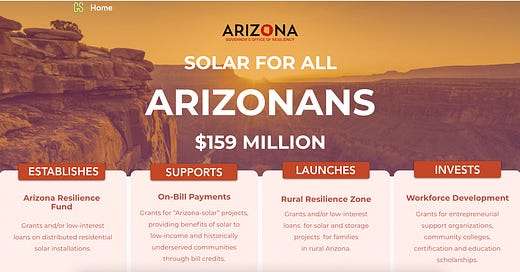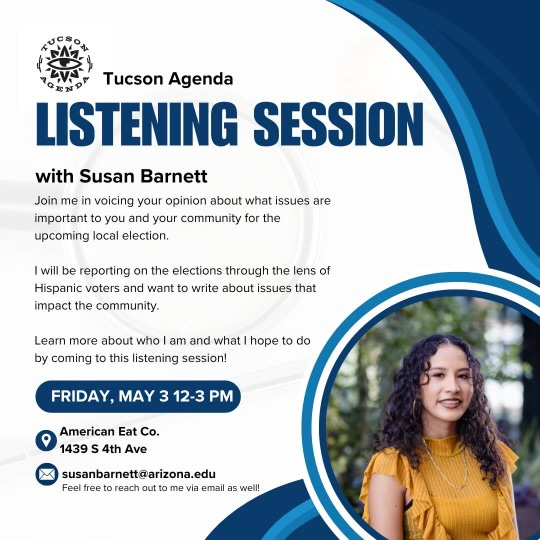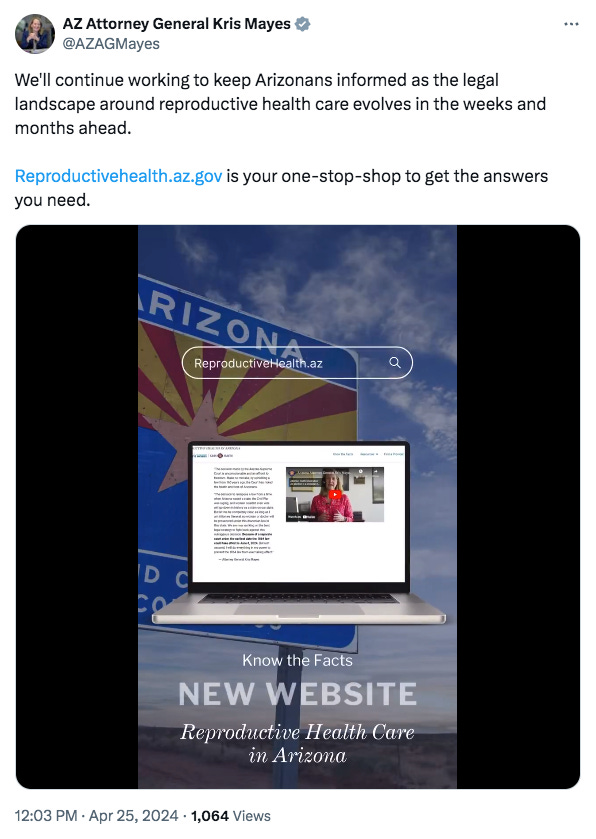The Climate Agenda: Arizona’s green bank is raking in the greenbacks
Tucson is home to the first green bank in the state … They’re raising big money and looking for collaborators … South Tucson 'slumlord' may face picketers.
If you follow financial news or are interested in sustainability, you’ve probably heard about “green banks” popping up all over the country.
Green banks are mission-driven financial entities that use public and private capital to fund clean energy projects and fight climate change.
And believe it or not, the state’s first and only green bank is right here in Tucson, which actually makes a lot of sense, given the city’s commitment to climate resiliency.
The nation's first green bank was started in Connecticut in 2011, but in the years since, more than a dozen states have established their own. When President Joe Biden announced a few years ago the creation of the Greenhouse Gas Reduction Fund and a proposed $27 billion in funding to combat the climate crisis, community leaders knew they’d be turning their backs on a lot of money if Arizona didn’t have a green bank.
Enter Groundswell Capital, which launched last year as a nonprofit affiliate of the Tucson Industrial Development Authority, a political subdivision that works with the City of Tucson to provide lower-cost financing for housing projects.

In just over a year, Groundswell has already secured a big portion of that federal funding, after this week’s announcement of a $159 million Solar for All grant which will help low-income and disadvantaged communities across the state fund solar energy projects.
“Tucson really has been ahead of the game in a lot of this. We were one of the first cities that were talking about a climate emergency, that came out in 2020, and we’ve really been pushing policies and thinking about how we as a city can be more resilient in general,” President and CEO Dre Thompson told the Tucson Agenda. “It really makes sense that this is an initiative to come out of Southern Arizona.”
The news of the Solar for All grant came days after Groundswell’s announcement that it had been accepted into an Equitable Water Infrastructure program, which includes $1.3 million to expand projects within the city’s Climate Action and Adaptation Plan and help boost the state’s long-term water resilience.
“We’re one of six green banks that were accepted into this coalition,” Thompson said. “(We're) really thinking about how we can finance water projects in low-income communities and rural communities that are typically left out or aren’t able to get the capital they need to ensure water equity and clean drinking water access.”
Thompson said that it’s exciting to be part of a group working to build financial products that can be replicated for other green banks to use, but there’s also a lot that Groundswell can learn from the other participating banks.
“Bring able to be at the table with these green banks that have really been leading the way is going to really help ensure that Arizona is getting a voice at the table and also getting the knowledge that has been accumulated by some of the green banks that have been doing this for 14 or 15 years.”
And while $27 billion sounds like a lot of money, it’s estimated that it will take several trillion dollars of funding to move the needle on climate change, according to Thompson. She said that’s why these types of collaborations between nonprofits and private funding are critical to help Groundswell identify projects, put together complex financial deals and attract private investors to bring their funding to Arizona.
There’s collaboration between green banks, too, Thompson said, adding that Groundswell participates in weekly and monthly calls with other banks to share ideas, successes and failures.
“This is a new field, a new industry, this is a ton of funding and I think we’re all feeling responsibility to ensure that it’s used really well to demonstrate that this is a good investment, and these are responsible ways to use private-public investments,” she said.
Thompson is eager to share ideas with collaborators from Tucson who have demonstrated success, including Storm to Shade and the Tree Equity program. But she’s also looking forward to hearing from community members about their water needs at an upcoming water forum on May 16.
And since Groundswell is affiliated with the Tucson IDA, a housing finance agency, many of the projects also take into consideration ways the funding can be used to increase affordable housing and address other challenges, including public transit, green spaces and more.
“We’re thinking very holistically about this funding,” Thompson said. “There’s something for everyone with this and it’s really about finding ways to build bridges.”
Groundswell will be engaging with cities, counties and tribes to encourage them to write grants and apply for the funding for both solar and water initiatives. Thompson said interested parties should check out Groundswell’s website, which includes examples of projects. With the funding expected to come in soon, Groundswell is hoping to start lining up projects quickly.
“This is what we were really wanting, to ensure that Arizona isn’t left out,” Thompson said. “What I’ve really found that Arizona has been trying to do is figure out how we can work together and how we can tie all this together so all this funding is targeting real families and making a difference to families today.”
Taking it to the streets: South Tucson City Council member Roxy Valenzuela said she plans to picket outside the home of the man she called a “slumlord,” the Arizona Daily Star’s Charles Borla reports. The city sued Brian Bowers over rampant criminal activity at two properties he owns. Valenzuela said if Bowers doesn’t sell the properties a “picket of his house in a gated community in the foothills will be organized.”
Then there were 11: At a public forum on Tuesday, Nina Trasoff bowed out of the process to replace Steve Kozachik on the Tucson City Council, the Tucson Sentinel’s Jim Nintzel reports. Trasoff said she was “passionate” about serving on the council, but there were plenty of other worthy candidates. The city council members are scheduled to appoint a replacement from the remaining 11 Democrats on May 6.
Plugging a loophole: A new federal regulation on selling firearms could require people who sell even one firearm to be prepared to show paperwork about who they sold it to, KGUN’s Kenny Darr reports. He spoke with a local lawyer, Grant Wille, about a Department of Justice rule that would close the “gun show loophole.”
"If you’re in the business of flipping houses,” Wille said. “You’re just getting started, you do one house. With that one house, you’re trying to make a profit, then you’re in the business of flipping houses."
No more strikes: The process for jury selection changed two years ago, and that might be why the Tucson area is seeing more mistrials, such as the recent hung jury in the Nogales rancher shooting case, KOLD’s Briana Whitney reports. State legislators abolished peremptory strikes, where defense lawyers and prosecutors can quickly excuse jurors because of something they said, they weren’t paying attention, or other reasons. Arizona is the only state that has abolished those strikes. Now, the people who might’ve been excused prior to the rule change are ending up on juries.
Team work makes the dream work: Pima County Supervisor Rex Scott makes his case for RTA Next in an op-ed in the Sentinel. Scott says business owners want to see cooperation among local government bodies when they choose sites for their operations. He didn’t explicitly refer to the City of Tucson’s murmurings about passing their own sales tax and pulling out of the regional transportation plan, but he did say if any one jurisdiction decided to “go it alone,” that would leave out a third of county residents who live in unincorporated areas.
New grocery chain incoming: The German discount grocery store Aldi is coming to Tucson, the Star’s Gabriela Rico reports. Aldi bought land near Park Avenue and Interstate 10, where it will join more than 50 retailers and hundreds of new homes. The grocery store chain specializes in selling its own brand of products at prices roughly half as expensive as national brands.
We don’t have a green bank to help raise capital for the Tucson Agenda, so we’re going to have to keep asking for your support. If you aren’t already paying for your subscription, today’s a great day to upgrade.
Tour the Living Lab and Learning Center
Join the Watershed Management Group tomorrow from 9 to 11 a.m. for a tour of the group’s Living Lab and Learning Center (1137 N. Dodge Blvd.,) a destination site for various water harvesting strategies and sustainable living practices. WMG has rainwater on tap and meets almost all of its water needs with rainwater, greywater and stormwater. Kids are welcome to come and enjoy the Raindrop Retreat, a playhouse with a rain tank, sandbox and play kitchen with greywater. The tour takes place outside, so be prepared to stand and walk for more than an hour. Find details and register here.
Flow and Feast at Tanque Verde
The Watershed Management Group is hosting its 7th annual Tanque Verde Flow and Feast celebration of its River Run Network program on Saturday, May 4 from 5 to 8 p.m. The free, family-friendly event features creek walks, a catered dinner with local flavors and nature-based activities along the creek. The event will be held in the Tanque Verde Bosque area, with all activities taking places in the creekbed and riparian forest. The event kicks off with a creek walk and will include paper boat building and a ceremonial boat release, a creekside feast, star gazing, storytelling and more. Find out more and register here.
Weedwackers at Tucson Mountain Park
Join the Sonoran Desert Weedwackers and Pima County Natural Resources, Parks and Recreation at Tucson Mountain Park for an invasive plant cleanup on Wednesday, May 8 from 7 to 11 a.m. Details about the meeting location within the park will be sent by email a few days ahead. Come prepared to hike off trail to reach the work area. Tools, snacks and drinks will be provided. Volunteers should bring water, snacks, a backpack and sunscreen. Learn more and register here.
Think globally, act locally
Pima Community College is hosting the 8th annual Ethnic, Gender, Transborder Studies & Sociology Summit on Friday, May 10 from 9 a.m. to 4:30 p.m. The event is free, open to the public and welcomes internationally known leaders in education, culture and politics to discuss topics impacting Tucson’s diverse communities. This year’s themes are “Climate Action, Sustainability, and Eco-Justice: Thinking Globally, Acting Locally.” The event will include an address by Tucson Mayor Regina Romero, workshops teaching practical skills, student projects and tabling by community groups. Breakfast and lunch will be provided for add-day attendees who register by May 5. Click here for more information or to RSVP.
Weigh in on water in the desert
Join the City of Tucson, Groundswell Capital and others in a community conversation about water conservation at the Tucson Industrial Development Authority (376 S. Stone Ave.) on Thursday, May 16 from 11 a.m. to 1 p.m. Attendees will learn about water conservation programs in the city, hear from stakeholders and leaders in water conservation and be asked to share ideas for programs and iniatives they’d like to see implemented in the community as part of Groundswell’s upcoming Equitable Water Infrastructure Initiative. On-site parking is available, but if the parking lot is full, the Tucson Convention Center parking garage is a 5-minute walk. Learn more and sign up here.
Upcoming meetings
City of Tucson Citizen’s Water Advisory Committee - Wednesday, May 1 at 8 a.m.
Oro Valley Water Utility Commission - Monday, May 13 at 5 p.m.
Tucson-Pima County Bicycle Advisory Committee - Wednesday, May 15 at 6 p.m.
Complete Streets Coordinating Council - Wednesday, May 22 at 5:30 p.m.
We’d love to hear your ideas for future editions of The Climate Agenda. Send those to caitlin@tucsonagenda.com.









